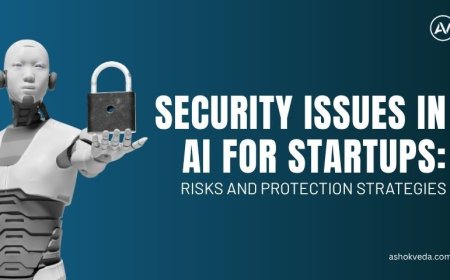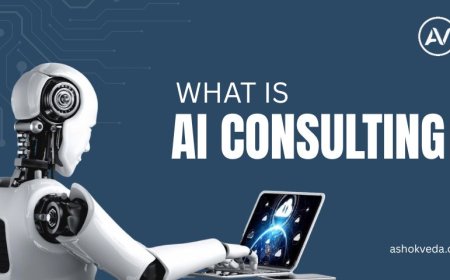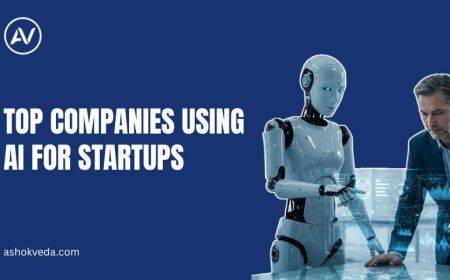AI Models Used in AI Consulting: Revolutionizing Strategies
Explore the key AI models used in AI consulting in 2025. Learn how LLMs, predictive analytics, machine learning, and other models are transforming consulting services.
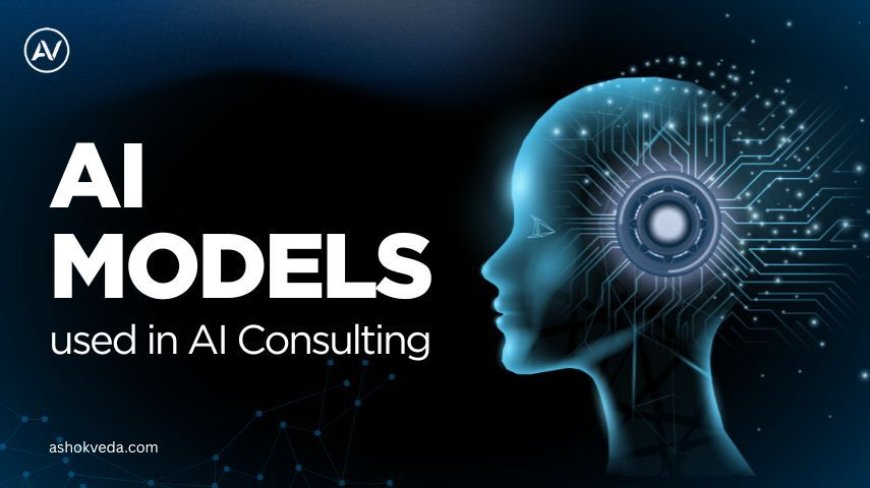
AI is no longer a futuristic concept but an essential part of the consulting industry. From optimizing operations to driving innovative solutions, AI models have proven to be transformative tools for consultants across industries. With AI technologies continually evolving, businesses now rely on data-driven insights, predictive models, and automation more than ever before. AI has become an integral part of the consulting world, particularly as businesses increasingly rely on data, machine learning (ML), and artificial intelligence to make smarter decisions.
According to research, AI’s contribution to the global consulting market is expected to grow at a 26% CAGR, reaching a market size of over $90 billion by 2035. This quick growth highlights how crucial AI-driven consulting services are becoming. For AI consultants, the primary challenge lies not only in developing these AI models but in ensuring their seamless integration into business operations. With applications ranging from predictive analytics to decision support systems, the AI models used in consulting are increasingly diverse and sophisticated.Explore the AI models used in AI consulting, how they are reshaping the industry, and what their application means for the future of consulting.
Key AI Models Used in AI Consulting
1. Large Language Models (LLMs)
LLMs such as OpenAI’s GPT and Google’s BERT have revolutionized AI consulting, especially in industries that rely on data interpretation and natural language processing. These models excel in:
-
Automating Text Generation: Creating reports, proposals, and content in a fraction of the time.
-
Customer Support Automation: Handling customer queries and generating responses automatically.
-
Data Interpretation: Summarizing complex data into digestible insights and reports.
LLMs have become essential tools for consulting firms that need to process vast amounts of unstructured text data quickly and efficiently. Their ability to generate human-like language is an incredible asset for creating detailed client reports or even assisting in real-time decision-making.
2. Predictive Analytics Models
Predictive analytics is an AI application that helps businesses predict future outcomes based on historical data. These models allow consultants to offer highly accurate forecasts about future trends, sales, and even customer behavior. Some common uses include:
-
Market Trend Prediction: Anticipating shifts in the market and consumer behavior.
-
Financial Forecasting: Predicting revenue streams, cost structures, and potential investment opportunities.
-
Risk Management: Identifying potential risks in a business’s operations, enabling proactive responses.
Predictive models enable consultants to deliver data-driven strategies, helping businesses make informed decisions backed by quantitative insights.
3. Decision Support Systems (DSS)
Decision support systems are interactive AI tools that help executives and decision-makers analyze complex data and make informed choices. These systems are powered by machine learning and statistical models to:
-
Simulate Various Scenarios: Consultants can use DSS to model the potential outcomes of different strategies, helping clients choose the optimal path.
-
Data-Driven Insights: DSS draws from vast datasets to identify patterns and correlations that human analysts might miss.
-
Resource Optimization: DSS helps businesses allocate resources efficiently and effectively, increasing productivity.
DSS has become a powerful tool for decision-making across industries, ensuring that the strategic choices made by executives are rooted in data and robust analysis.
4. Machine Learning Algorithms
Machine learning models are fundamental to AI consulting, enabling consultants to build systems that learn from data and improve over time. ML models are applied in various areas, such as:
-
Customer Segmentation: Identifying different customer groups based on behavior and demographics, which allows for targeted marketing and tailored services.
-
Anomaly Detection: Identifying unusual patterns or fraud, particularly in financial transactions, network security, or supply chain management.
-
Predictive Maintenance: Monitoring equipment and machinery to predict failure before it happens, minimizing downtime.
These models help consultants optimize business operations, enhance customer engagement, and improve overall service delivery.
5. Generative AI Models (GANs and VAEs)
Generative AI models like Generative Adversarial Networks (GANs) and Variational Autoencoders (VAEs) are changing the way consultants approach content creation and data synthesis. Some key uses include:
-
Content Creation: Generating high-quality images, videos, and text-based content automatically, which can be especially useful in digital marketing or product design.
-
Data Augmentation: Generating synthetic data to train other AI models, especially when real-world data is scarce or difficult to obtain.
-
Personalization: Tailoring user experiences in real-time by generating content that resonates with specific customer preferences.
Generative AI offers consultants innovative ways to provide personalized, creative solutions to clients while increasing operational efficiency.
How AI Models Are Applied in AI Consulting
1. Strategic Decision-Making
AI models are crucial in strategic consulting, as they provide businesses with insights that guide decision-making. Whether it's for market expansion, investment opportunities, or product development, AI models help consultants provide evidence-based recommendations to clients. By analyzing historical data and predicting future trends, consultants can offer high-quality, data-driven strategies to enhance business outcomes.
2. Optimizing Business Operations
AI-powered solutions are also revolutionizing the operational side of consulting. Consultants use AI models to streamline processes, improve efficiency, and reduce costs. Common applications include:
-
Supply Chain Optimization: Predicting demand, optimizing routes, and automating inventory management.
-
Operational Efficiency: Identifying inefficiencies and recommending changes based on real-time data analysis.
-
Cost Reduction: Using predictive models to forecast spending patterns and help clients reduce unnecessary expenses.
AI models enable consultants to identify areas of improvement and suggest measures to optimize business processes effectively.
3. Enhancing Customer Engagement
Customer engagement is crucial for the success of any business. AI models help consultants craft strategies that deliver personalized customer experiences. These models can:
-
Personalize Offers and Recommendations: By analyzing customer behavior and preferences, AI models can suggest products or services that are most likely to be of interest.
-
Automate Customer Service: Chatbots and virtual assistants powered by AI models help businesses interact with customers 24/7, providing quick responses to queries and support.
-
Improve Retention: AI-driven insights allow consultants to identify at-risk customers and design targeted strategies to retain them.
By leveraging AI for customer engagement, consultants help businesses enhance loyalty and customer satisfaction, which in turn drives growth.
Benefits of Using AI Models in Consulting
-
Improved Efficiency: AI models automate time-consuming tasks, allowing consultants to focus on high-value activities.
-
Data-Driven Insights: AI provides more accurate and actionable insights, ensuring that decisions are based on data rather than intuition.
-
Personalization: AI models help deliver customized solutions to clients, whether it's for marketing, operations, or customer service.
-
Cost Reduction: Through process optimization and predictive maintenance, AI models help businesses reduce costs and improve profitability.
-
Innovation: AI models enable consultants to offer innovative solutions that would otherwise be difficult or impossible to achieve.
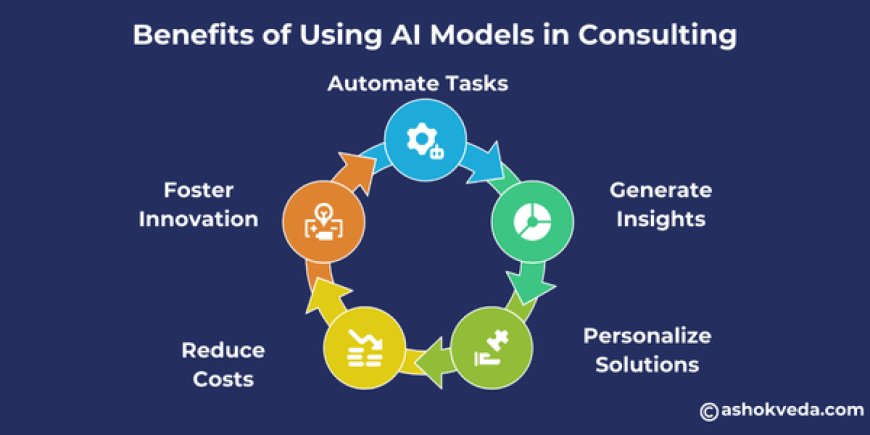
Challenges of Implementing AI Models in Consulting
Despite their benefits, integrating AI models into consulting services comes with challenges:
-
Data Quality and Availability: AI models require clean, reliable data. Inadequate or poor-quality data can lead to inaccurate predictions and flawed recommendations.
-
Model Interpretability: Some AI models, particularly deep learning models, operate as “black boxes,” making it difficult for consultants to explain their reasoning and decisions to clients.
-
Ethical Considerations: There are concerns regarding bias in AI models and the ethical implications of automating certain decision-making processes.
-
Integration with Existing Systems: Many businesses still rely on legacy systems, and integrating new AI models with these platforms can be complex.
These challenges require careful planning, proper implementation strategies, and continuous monitoring to ensure that AI models are used effectively.
The role of AI models in AI consulting is rapidly evolving, with new models and technologies emerging constantly. As we move through 2025, the reliance on AI will only grow, enabling consultants to deliver more accurate, efficient, and personalized solutions. By embracing these models, businesses can stay ahead of the competition, optimize their operations, and drive sustainable growth. However, AI consultants must stay informed about the latest trends, model developments, and best practices to fully harness the power of AI in consulting. The future of AI consulting promises even greater innovations, and those who adapt will reap the rewards of a data-driven, AI-enhanced consulting world.

























